

How an esoteric economic theory—and its most devout believers—changed the world forever.
In the modern economy, stock price is king. The value of a corporation is measured in how it enriches its shareholders, even when doing so subtracts from long-term growth or social good. Greed, in the last half-century of corporate practice, has become very good. Company Men is a sweeping intellectual history of how shareholder value rose from the lesser-known edges of academic theory to the vanguard of corporate practice.
Historian Sean Delehanty marshals archival resources to reveal how a group of motivated consultants, activist investors, and academic economists successfully branded shareholder value as the antidote to problems of management and economic stagnation in the 1970s. In their success, they created a class of well-heeled managers who executed shareholder-value theory as an everyday practice—and at the expense of most everything else. Delehanty’s history of the modern American corporation is a sobering account of the business regime that would rule the world and produce no shortage of regrets—even amongst those who championed it. Company Men is intellectual history at its most vital, offering a surprising origin story of our economy’s discontents.

What corporate governance problems arise in tightly held firms? How do these differ from corporate governance problems in widely held firms? How do control blocks arise and how are they maintained? How does concentrated ownership affect economic growth? How should we regulate tightly held firms?
Drawing together leading scholars from law, economics, and finance, this volume examines the economic and legal issues of concentrated ownership and their impact on a shifting global economy.
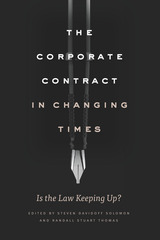
With The Corporate Contract in Changing Times, Steven Davidoff Solomon and Randall Stuart Thomas bring together leading corporate law scholars, judges, and lawyers from top corporate law firms to explore what needs to change and what has prevented reform thus far. Among the topics addressed are how the law could be adapted to the reality that activist hedge funds pose a more serious threat to corporations than the hostile takeovers and how statutory laws, such as the rules governing appraisal rights, could be reviewed in the wake of appraisal arbitrage. Together, the contributors surface promising paths forward for future corporate law and public policy.



Refinery explosions. Accounting scandals. Bank meltdowns. All of these catastrophes—and many more—might rightfully be blamed on corporations. In response, advocates have suggested reforms ranging from increased government regulation to corporate codes of conduct to stop corporate abuses. Joshua Barkan writes that these reactions, which view law as a limit on corporations, misunderstand the role of law in fostering corporate power.
In Corporate Sovereignty, Barkan argues that corporate power should be rethought as a mode of political sovereignty. Rather than treating the economic power of corporations as a threat to the political sovereignty of states, Barkan shows that the two are ontologically linked. Situating analysis of U.S., British, and international corporate law alongside careful readings in political and social theory, he demonstrates that the Anglo-American corporation and modern political sovereignty are founded in and bound together through a principle of legally sanctioned immunity from law. The problems that corporate-led globalization present for governments result not from regulatory failures as much as from corporate immunity that is being exported across the globe.
For Barkan, there is a paradox in that corporations, which are legal creations, are given such power that they undermine the sovereignty of states. He notes that while the relationship between states and corporations may appear adversarial, it is in fact a kind of doubling in which state sovereignty and corporate power are both conjoined and in conflict. Our refusal to grapple with the peculiar nature of this doubling means that some of our best efforts to control corporations unwittingly reinvest the sovereign powers they oppose.

A quiet revolution came to corporate America during the late 1980s and early 1990s. Large shareholders—pension funds, insurance companies, money manages, and commercial banks—exercised new-found muscle, pressuring senior managers to improve disappointing financial results by reshaping their organization. Michael Useem reveals how those investor pressures have transformed the inside structures of many corporations, better aligning them with shareholder interest.
Useem draws on numerous sources, including interviews with senior managers and intensive studies of seven large corporations representing a range of restructuring experiences and industries—including pharmaceuticals, transportation, chemicals, retailing, electronics, and financial services. He shows that organizational changes have affected many areas of corporate life: headquarters staffs have been reduced authority has filtered down to operating units, and compensation has become more closely tied to performance. Change also extends to corporate governance, where managers have fought back by seeking legal safeguards against takeovers and by staggering board terms. They’ve also put significant resources into building more effective relations with shareholders.
As Useem demonstrates, this revolution has reached beyond the corporation, influencing American politics and law. As increasing ownership concentration has caused companies to focus more attention on shareholders, corporate political agendas have shifted from fighting government regulation to resisting shareholder intrusion.
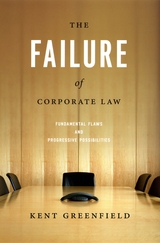
When used in conjunction with corporations, the term “public” is misleading. Anyone can purchase shares of stock, but public corporations themselves are uninhibited by a sense of societal obligation or strict public oversight. In fact, managers of most large firms are prohibited by law from taking into account the interests of the public in decision making, if doing so hurts shareholders. But this has not always been the case, as until the beginning of the twentieth century, public corporations were deemed to have important civic responsibilities.
With The Failure of Corporate Law, Kent Greenfield hopes to return corporate law to a system in which the public has a greater say in how firms are governed. Greenfield maintains that the laws controlling firms should be much more protective of the public interest and of the corporation’s various stakeholders, such as employees. Only when the law of corporations is evaluated as a branch of public law—as with constitutional law or environmental law—will it be clear what types of changes can be made in corporate governance to improve the common good. Greenfield proposes changes in corporate governance that would enable corporations to meet the progressive goal of creating wealth for society as a whole rather than merely for shareholders and executives.

In most contexts, privatization is expected to yield greater efficiency and cost effectiveness while avoiding the corruption and bloated budgets of government regulation or monopoly control. But broad-scale privatization, if ill designed, has also yielded its share of difficulties in East Asia. Privatization sometimes has created a vacuum in corporate governance for some of the region's most important industries and in some cases merely reinstated the monopoly-like configurations. The papers presented in this book discuss the experiences of privatization in several industries, including railroad and telecom, corporate governance problems, accounting issues, and challenges for the future in East Asian countries.
The first section is theoretical in nature and proposes boundaries among government protection, market freedom, and shareholder expectations. The second part is constituted by country case studies, beginning with an analysis of both the Korean financial crisis that followed its 1997 law to privatize large, public sector corporations and the new ways Korean corporations finance themselves. Following is an evaluation of China's approach to privatization, with an in-depth look at the financial transitions of companies slated for initial public offering.
Providing provocative examples of the methods of privatization in the Asia-Pacific region specifically, these papers will be of huge import to any economist or policymaker interested in transposing those successes for their own region.

In this volume, some of the brightest minds in the field of economics present new empirical research that suggests that each side of the debate has something to offer the other. Free enterprise and well-developed financial systems are proven to produce growth in those countries that have them. But research also suggests that in some other capitalist countries, arrangements truly do concentrate corporate ownership in the hands of a few wealthy families.
A History of Corporate Governance around the World provides historical studies of the patterns of corporate governance in several countries-including the large industrial economies of Canada, France, Germany, Italy, Japan, the United Kingdom, and the United States; larger developing economies like China and India; and alternative models like those of the Netherlands and Sweden.

Using comparative case studies that address the United States, China, Germany, Japan, Korea, and Russia, Curtis J. Milhaupt and Katharina Pistor argue that a disparate blend of legal and nonlegal mechanisms have supported economic growth around the world. Their groundbreaking findings show that law and markets evolve together in a “rolling relationship,” and legal systems, including those of the most successful economies, therefore differ significantly in their organizational characteristics. Innovative and insightful, Law and Capitalism will change the way lawyers, economists, policy makers, and business leaders think about legal regulation in an increasingly global market for capital and corporate governance.
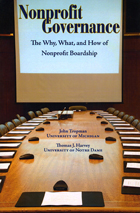
This thorough volume offers up-to-date information and practical guidelines for board members and executives of nonprofit organizations large and small. Among the topics addressed are the historical roots of the voluntary sector in America, a complete discussion of the key responsibilities of nonprofit boards, suggestions for board organization, appropriate protocol for meetings, legal issues affecting nonprofit groups, and useful tools for self-assessment. This guide will be indispensable to the almost two million nonprofit organizations existing in the United States today.
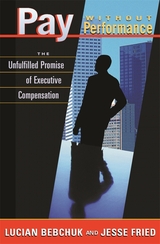
The company is under-performing, its share price is trailing, and the CEO gets...a multi-million-dollar raise. This story is familiar, for good reason: as this book clearly demonstrates, structural flaws in corporate governance have produced widespread distortions in executive pay. Pay without Performance presents a disconcerting portrait of managers' influence over their own pay--and of a governance system that must fundamentally change if firms are to be managed in the interest of shareholders.
Lucian Bebchuk and Jesse Fried demonstrate that corporate boards have persistently failed to negotiate at arm's length with the executives they are meant to oversee. They give a richly detailed account of how pay practices--from option plans to retirement benefits--have decoupled compensation from performance and have camouflaged both the amount and performance-insensitivity of pay. Executives' unwonted influence over their compensation has hurt shareholders by increasing pay levels and, even more importantly, by leading to practices that dilute and distort managers' incentives.
This book identifies basic problems with our current reliance on boards as guardians of shareholder interests. And the solution, the authors argue, is not merely to make these boards more independent of executives as recent reforms attempt to do. Rather, boards should also be made more dependent on shareholders by eliminating the arrangements that entrench directors and insulate them from their shareholders. A powerful critique of executive compensation and corporate governance, Pay without Performance points the way to restoring corporate integrity and improving corporate performance.

Understanding the challenges of corporate governance is central to our comprehension of the economic dynamics driving corporations today. Among the most important institutions in capitalism today, corporations and joint-stock companies had their origins in Europe during the seventeenth and eighteenth centuries. And as they became more prevalent, the issue of internal governance became more pressing. At stake—and very much contested—was the allocation of rights and obligations among shareholders, directors, and managers.
This comprehensive account of the development of corporate governance in Britain and Ireland during its earliest stages highlights the role of political factors in shaping the evolution of corporate governance as well as the important debates that arose about the division of authority and responsibility. Political and economic institutions confronted similar issues, including the need for transparency and accountability in decision making and the roles of electors and the elected, and this book emphasizes how political institutions—from election procedures to assemblies to annual reporting—therefore provided apt models upon which companies drew readily. Filling a gap in the literature on early corporate economy, this book provides insight into the origins of many ongoing modern debates.
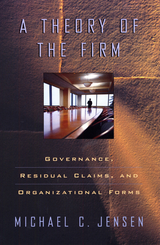
This collection examines the forces, both external and internal, that lead corporations to behave efficiently and to create wealth. Corporations vest control rights in shareholders, the author argues, because they are the constituency that bear business risk and therefore have the appropriate incentives to maximize corporate value. Assigning control to any other group would be tantamount to allowing that group to play poker with someone else's money, and would create inefficiencies. The implicit denial of this proposition is the fallacy of the so-called stakeholder theory of the corporation, which argues that corporations should be run in the interests of all stakeholders. This theory offers no account of how conflicts between different stakeholders are to be resolved, and gives managers no principle on which to base decisions, except to follow their own preferences.
In practice, shareholders delegate their control rights to a board of directors, who hire, fire, and set the compensation of the chief officers of the firm. However, because agents have different incentives than the principals they represent, they can destroy corporate value unless closely monitored. This happened in the 1960s and led to hostile takeovers in the market for corporate control in the 1970s and 1980s. The author argues that the takeover movement generated increases in corporate efficiency that exceeded $1.5 trillion and helped to lay the foundation for the great economic boom of the 1990s.

American courts routinely hand down harsh sentences to individual convicts, but a very different standard of justice applies to corporations. Too Big to Jail takes readers into a complex, compromised world of backroom deals, for an unprecedented look at what happens when criminal charges are brought against a major company in the United States.
Federal prosecutors benefit from expansive statutes that allow an entire firm to be held liable for a crime by a single employee. But when prosecutors target the Goliaths of the corporate world, they find themselves at a huge disadvantage. The government that bailed out corporations considered too economically important to fail also negotiates settlements permitting giant firms to avoid the consequences of criminal convictions. Presenting detailed data from more than a decade of federal cases, Brandon Garrett reveals a pattern of negotiation and settlement in which prosecutors demand admissions of wrongdoing, impose penalties, and require structural reforms. However, those reforms are usually vaguely defined. Many companies pay no criminal fine, and even the biggest blockbuster payments are often greatly reduced. While companies must cooperate in the investigations, high-level employees tend to get off scot-free.
The practical reality is that when prosecutors face Hydra-headed corporate defendants prepared to spend hundreds of millions on lawyers, such agreements may be the only way to get any result at all. Too Big to Jail describes concrete ways to improve corporate law enforcement by insisting on more stringent prosecution agreements, ongoing judicial review, and greater transparency.
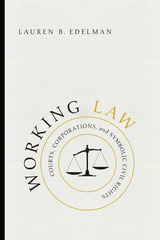
One reason for the limited success of antidiscrimination policies, argues Lauren B. Edelman, is that the law regulating companies is broad and ambiguous, and managers therefore play a critical role in shaping what it means in daily practice. Often, what results are policies and procedures that are largely symbolic and fail to dispel long-standing patterns of discrimination. Even more troubling, these meanings of the law that evolve within companies tend to eventually make their way back into the legal domain, inconspicuously influencing lawyers for both plaintiffs and defendants and even judges. When courts look to the presence of antidiscrimination policies and personnel manuals to infer fair practices and to the presence of diversity training programs without examining whether these policies are effective in combating discrimination and achieving racial and gender diversity, they wind up condoning practices that deviate considerably from the legal ideals.
READERS
Browse our collection.
PUBLISHERS
See BiblioVault's publisher services.
STUDENT SERVICES
Files for college accessibility offices.
UChicago Accessibility Resources
home | accessibility | search | about | contact us
BiblioVault ® 2001 - 2025
The University of Chicago Press









